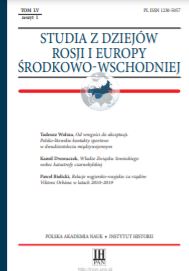Instrumentalizacja prawosławia w polityce wewnętrznej i zagranicznej Rosji w świetle raportu Mirosława Dobrianskiego z 1883 roku
Instrumentalisation of the Orthodox Church in the Internal and Foreign Policy of Russia in the Light of Mirosław Dobrianski’s Report of 1883
Author(s): Michał SempołowiczSubject(s): Christian Theology and Religion, History of Church(es), 19th Century, Eastern Orthodoxy, Other Christian Denominations
Published by: Instytut Historii im. Tadeusza Manteuffla Polskiej Akademii Nauk
Keywords: Russian Empire; Kingdom of Poland; Uniates; Orthodox Church; religious policy;
Summary/Abstract: In 1875, the Uniate Church was abolished in the Kingdom of Poland, and its followers were formally ascribed to the Orthodox Church. Many of them did not observe the Orthodox rites and obligations, and they used the service of Roman Catholic priests. The situation did not change despite the lapse of time. The secular head of the Orthodox Church, Ober-Procurator of the Most Holy Synod Constantin Pobiedonostsev, ordered a report to be prepared about the situation of the Orthodox Church in the post-Uniate areas based on field observations. Those were made by Mirosław Dobrianski, the son of a Russophile activist in Galicia. In his report, he made a highly critical evaluation of the situation, without sparing the Russians. He pointed out mistakes of the administration, the lack of consistent regulations of offi cials and judges, and the antagonism between the Church and state authorities. He emphasised the hostile attitude of the Catholic clergy, landowners, and Polish officials. He concluded that in order to defeat the Roman Catholic Church and Polishness, all Russian efforts and forces should be combined. He recommended, among others, to impose more harsh punishment on Roman Catholic priests, to support the peasantry against the nobility, and develop the Russian educational system. He also proposed a gradual separation of the post-Uniate areas from the power of the Warsaw general-governorate to establish a separate gubernya. Dobrianski’s minor recommendations were not implemented, and after the Edict of Toleration issued in 1905, the former Uniates converted in large numbers to Roman Catholicism. The postulate to establish a separate gubernya gained the official support of Pobiedonostsev. It was implemented in 1912 in the form of the Gubernya of Chełm. It is hard to assess the consequences of this fact for the growth of the Orthodox Church and shaping of the national identity of the Chełm Governorate population, for Russia lost this territory as soon as 1915.
Journal: Studia z Dziejów Rosji i Europy Środkowo-Wschodniej
- Issue Year: 55/2020
- Issue No: 1
- Page Range: 93-108
- Page Count: 16
- Language: Polish

